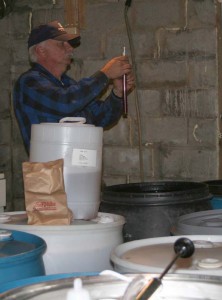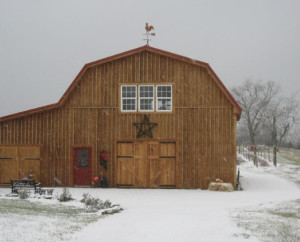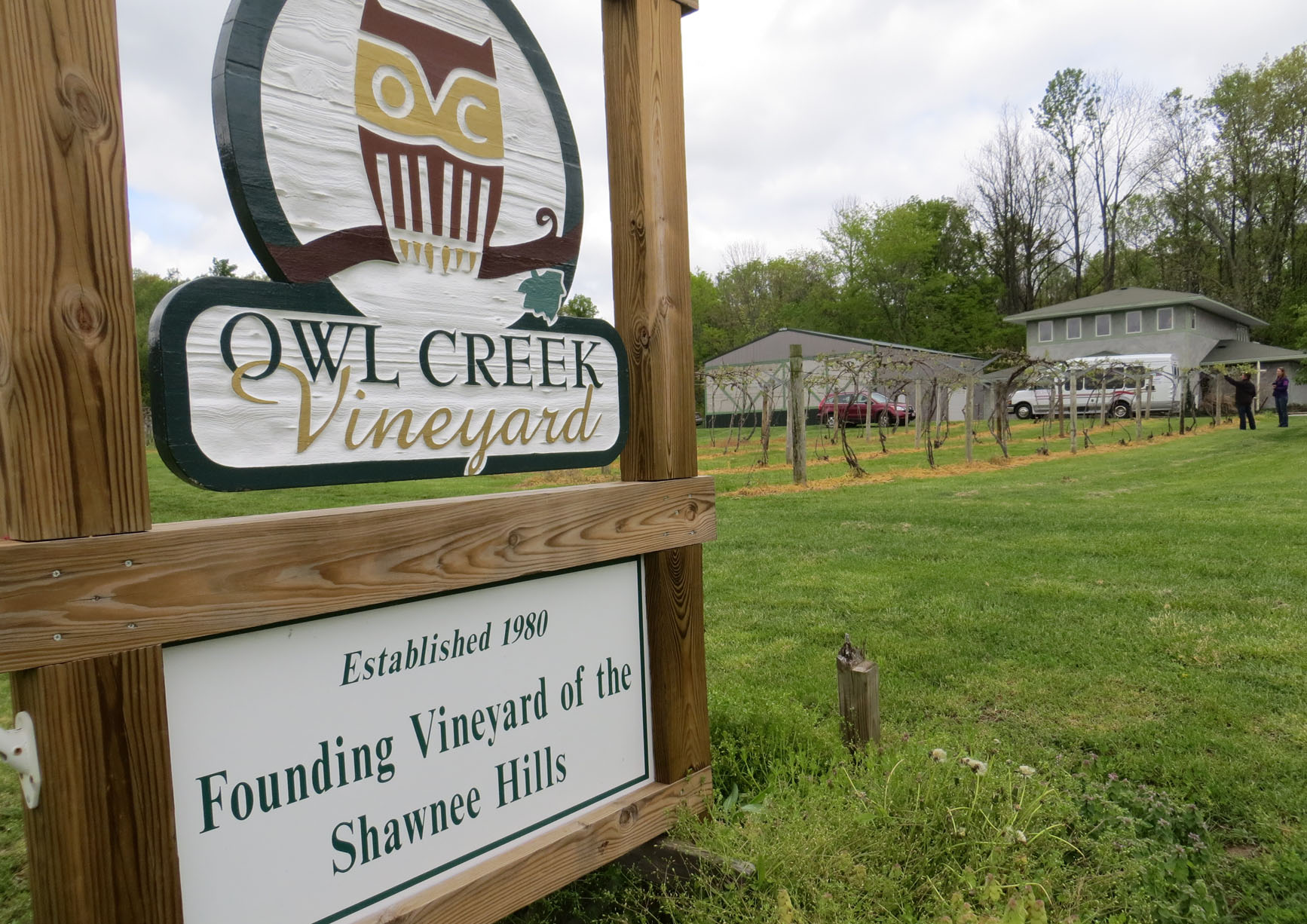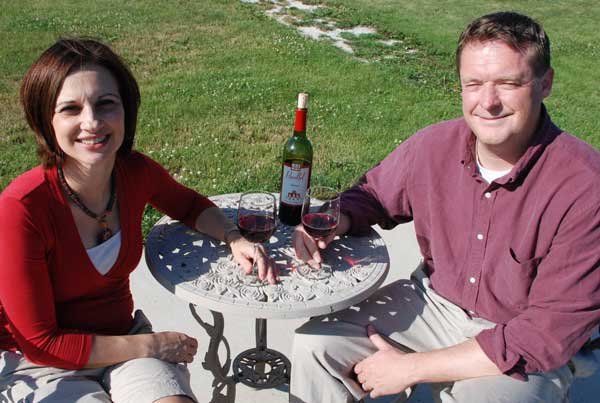Kentucky Berry Wine Tradition Continues
Kentucky winemakers have found their sweet spot in the wine business – berry wines.
Blackberry wine alone accounts for 20 percent of Rose Hill Farm Winery’s total sales, says owner Jenny Beetz. Rose Hill, just south of Cincinnati, sells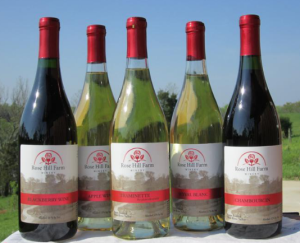 nine products at farmers’ markets and blackberry wine is always the first the go, Beetz says. ‘If you don’t have blackberry wine, you’d better have it the next time,” she says.
nine products at farmers’ markets and blackberry wine is always the first the go, Beetz says. ‘If you don’t have blackberry wine, you’d better have it the next time,” she says.
This berry wine demand stems from family tradition, says Don Keller, owner of Misty Meadow Winery in Owensboro.
Although Kentucky is thought to be home of the first U.S. commercial vineyard in the late 1790s, pioneers planted berry bushes because grapes were not readily available and started making berry wine.
This tradition was passed down from one generation to another, leading Kentuckians to fall in love with blackberry wine’s balance of sweet and tart notes. Today, children who once picked the berries on the farm are grownups who are buying berry wine at farmers markets, wine festivals and local retailers.
This nostalgia made blackberry wine Stonebrook Winery’s No. 1-selling fruit wine, says owner Dennis Walter. Stonebrook sells more than 1,000 cases of blackberry wine a year.
‘Kentuckians have a history of wine being made from fruits off the farm, but they also like things a little sweeter,” Walter says. ‘The success of berry wine might be a little bit nostalgic and a little bit of sweet.”
Berry wines are also more approachable to the average Kentucky consumer, says Alicia McGuire, the executive director for the Kentucky Vineyard Society.
‘They do well in this state because there are a lot of beginning wine drinkers,” McGuire says.
McGuire says many beginners are turned off by dry reds and whites, opening the door for easier-to-understand berry wines. This, in turn, opens the door for winemakers to educate consumers about the beauty and complexities of other wines. ‘That is what we hope for in Kentucky, that we can gain some wine drinkers perhaps with our sweet wines and advance to our dry reds,” she says.
Berry Wine in the Making
Many Kentucky winemakers are former tobacco farmers who took part in the state’s $3.45 billion tobacco settlement which will be paid out over 25 years. To help farmers, the state created a Kentucky Proud program in which retailers and restaurants receive incentives for selling Kentucky farm products with the Kentucky Proud label. It’s an excellent marketing program for Kentucky wine, but also hinders procurement of Kentucky berries.
Many berry growers turn their product into jams and preservatives to sell themselves. Furthermore, blackberry growers are earning a premium for fruits that are turned into blackberry extract and used for medicinal purposes. Oftentimes, if the blackberries are not estate grown, the winemakers cannot find enough Kentucky berries to purchase and must buy from a broker.
‘I don’t know where [the berries] come from, but we deal with a broker and call him when we need them,” Walter says.
Chrisman Mill Vineyards in Nicholasville purchases its blackberries from the Pacific Northwest, says McGuire. But, Keller says buying from a grower can be problematic.
‘Growers are ready to pick them as soon as they can and get rid of them, so they can get their money before the birds get them,” Keller says. ‘You need to wait until the berries lose that acid and sugar content goes up.”
But, growing local berries is not always the easiest strategy.
‘Tending to the blackberries and the grapes can be kind of hectic,” Beetz of Rose Hill says. “Since we grow blackberries, labor expense adds to the cost of the wine, and probably factoring in the cost of the labor, I would say that purchasing the blackberries, or the juice, would be the least expensive way to go. However, I think growing the blackberries on our farm adds value to our product.”
Rose Hill Winery boasts 800 blackberry bushes that yield about 500 pounds of berries. The winery will pick, clean and place the berries in freezer bags until they have time to make wine. After crush, Rose Hill uses pectic enzyme to help break down the berries with added sugar and water.
‘You have to add some water because it’s pretty acidic,” Beetz says. ‘We’ve had some wine that we’ve let sit around for months and that acidity can really be a problem. But we’ve been told to keep throwing sugar at it. … But, there are a million ways to make blackberry wine.”
For Keller, he simply ages his Misty Meadow Winery berry wines longer.
With elderberry wine, he picks at peak ripeness, separates the toxic stems, freezes, crushes and filters his wine before bottling. Once in the bottle, he ages elderberry for three years in his climate-controlled cellar. He uses similar processes for strawberry and blackberry, all in an effort to find the dryness in what are typically sweeter wines.
Keller believes dry strawberry wines are Chardonnay-like, while a dry blackberry wine leans toward a Merlot.
‘Dry berry wines are interesting and taste good,” he says.
Fred Minnick is a WSJ-best-selling author who regularly writes for wine and spirits publications. Based in Louisville, Ky., Fred’s work can be viewed at FredWrite.com
Homepage photo: The view from the porch at StoneBrook Winery

